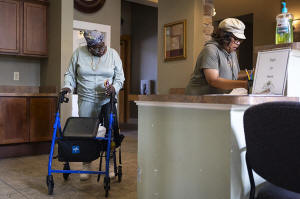People on breathing machines struggle without power after weather
disasters
 Send a link to a friend
Send a link to a friend
 [November 23, 2024]
By NADIA LATHAN [November 23, 2024]
By NADIA LATHAN
HOUSTON (AP) — Kimberly Rubit had one priority in mind as Hurricane
Beryl ripped through Houston this summer: her severely disabled
daughter.
The 63-year-old worked nonstop to prevent Mary, 42, from overheating
without air conditioning, water or lights after Beryl knocked out power
to their home for 10 days. At least three dozen other people suffered
heat-related deaths during the extended outage.
“It was miserable,” Rubit said. “I’m sick of it.”
Electric grids have buckled more frequently and outages have become
longer across the U.S. as the warming atmosphere carries more water and
stirs up more destructive storms, according to an AP analysis of
government data. In the Pacific Northwest this week, a “ bomb cyclone ”
caused roughly half a million outages.
People with disabilities and chronic health conditions are particularly
at risk when the power goes out, and many live in homes that lack the
weatherizing and backup power supplies needed to better handle high
temperatures and cold freezes, or can't pay their electricity bills,
said Columbia University sociomedical sciences professor Diana
Hernandez, who studies energy instability in U.S. homes.
At any given time, one in three households in the U.S. is "actively
trying to avoid a disconnection or contending with the aftermath of it,”
Hernandez said.
In Texas, as another winter approaches, people can't shake fears of
another blackout like the one during a cold freeze in 2021 that left
millions without power for days and killed more than 200 people. Despite
efforts to create more resilience, a winter storm that powerful could
still lead to rolling blackouts, according to ERCOT, which manages most
of the state's power grid.
Beryl also knocked out power to millions for days, sickening many in the
sweltering July heat. Local and state officials showered criticism on
CenterPoint Energy, Houston’s power utility, saying it should have
communicated more clearly, taken more preventive measures such as tree
trimming before the storm hit and repaired downed power lines more
quickly. The utility's response remains under investigation by the Texas
attorney general.
CenterPoint says it is focused now on improving resiliency, customer
communications and community partnerships with the one defining goal:
“to build the most resilient coastal grid in the country that can better
withstand the extreme weather of the future.”
Texas lawmakers, meanwhile, are debating whether assisted living
facilities need more regulation. One suggestion: requiring them to have
enough emergency generator fuel to power lifesaving equipment and keep
indoor temperatures safe during an extended blackout, as Florida did
after a scandal over hurricane-related nursing home deaths.

The legislative panel also reviewed emergency responses this month.
Regulated facilities and nursing centers fared better than places such
as senior communities that aren't subject to strict oversight, according
to city and state officials. This meant hundreds of apartment complexes
catering to older adults, as well as private homes, were likely more
susceptible to losing power and going without food.
[to top of second column]
|

Patricia Johnican greets Lady Belinda Taylor as she passes through a
common kitchen area after Wednesday bingo at Commons of Grace Senior
on Wednesday, Sept. 25, 2024, in Houston. (AP Photo / Annie
Mulligan)
 “We’ve got to find a way to mark
these facilities or get it entered into the computer dispatch
systems,” said Nim Kidd, chief of the Texas Division of Emergency
Management. “There are so many places in our own city that we have
no idea until that 911 call comes in to that facility,” he said.
Texas energy companies have been required since 2003 to provide
advance notice of scheduled outages to medically vulnerable
households that submit a form with physician approval. But that law
didn't require the utilities to share these lists with state or
local emergency management agencies.
Numerous states have similar regulatory requirements and 38 have
policies aimed at preventing disconnections during extreme weather,
according to the Low Income Home Energy Assistance Program. In
Colorado, medically vulnerable residents are protected from
disconnection for up to 90 days. In Arkansas, utilities can’t
disconnect power to people who are 65 or older if temperatures are
forecast to reach above 94 degrees Fahrenheit (34 Celsius).

In Houston, Rubit and her daughter share one of the roughly 3,000
households where unreliable power can quickly spiral into a
life-and-death issue because at least one person requires a medical
device powered by electricity, according to public filings from
CenterPoint. The utility offers such households payment plans to
keep the electricity on when they fall behind on their bills.
The utility's efforts bring little solace to community members at a
Houston living center for seniors, Commons of Grace, where outages
have become a haunting facet of life for more than 100 residents,
said Belinda Taylor, who runs a nonprofit partnered with the
managing company.
“I’m just frustrated that we didn’t get the services that we
needed,” Taylor said. “It’s ridiculous that we have had to suffer.”
Sharon Burks, who lives at Commons of Grace, said it became
unbearable when the power went out. She is 63 and uses a breathing
machine for chronic obstructive pulmonary disease, which causes
shortness of breath. She had to resort to her battery-powered
breathing pump, which isn’t meant to be used for long periods.
“I didn’t expect anything from CenterPoint," Burks said. "We’re
always the last to get it.”
All contents © copyright 2024 Associated Press. All rights reserved
 |